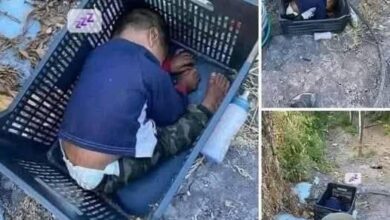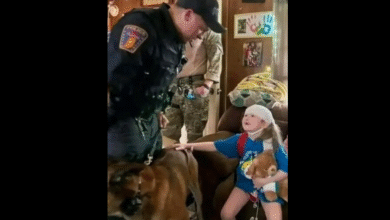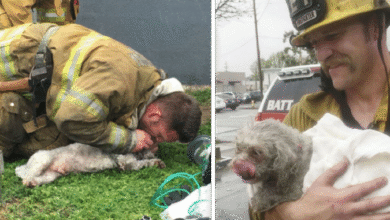The Coins In The Desk Drawer
When my sister was little, our dad called her over for a serious talk. He said, “I found this in your desk. Where did it come from?” and pulled out a plastic bag filled with coins. My sister froze, looking terrified, then whispered, “It’s my pay for cleaning Ms. Carla’s porch.”
Dad blinked. “Ms. Carla? From across the street?”
My sister nodded slowly, her lip trembling. She was about nine at the time, a tiny thing with big brown eyes that could melt stone. But this wasn’t a puppy-dog moment. She was actually scared.
“You’ve been doing chores for her?” Dad asked, softening his tone.
“Only on weekends,” she said. “She gives me a dollar for sweeping, and sometimes two if I wash the steps too.”
There was a long silence.
Dad glanced at the bag again—it looked like there were at least twenty dollars’ worth of coins. “Did she ask you to work for her, or did you offer?”
“I offered,” my sister said quickly. “She was struggling with the broom one day. I just asked if she wanted help.”
I was sitting on the stairs listening. I remember thinking how weird it was—my sister never wanted to sweep our own porch. She’d whine for half an hour if you asked her to rinse a dish. But this? This she did willingly?
That night, after the house calmed down, Dad sat with Mom in the kitchen and spoke in low tones. I couldn’t hear much, but I caught a few words: “Too young,” “strange woman,” and “boundaries.”
Still, they didn’t forbid her from going over there again. They just said she had to ask first and could only go if one of them was home.
Weeks passed, and the whole thing became normal. My sister would trot across the street with a broom in one hand and a small bucket in the other. She’d be gone an hour or two, then return with a coin or two clutched in her palm.
One Sunday afternoon, I got curious and followed her—not sneakily, just curious. Ms. Carla’s porch was always clean when she was done. But I noticed something odd: sometimes she’d be inside for long periods. I stood across the street, pretending to kick pebbles, but watching.
My sister came out twenty minutes later, carrying a small brown box. She looked both proud and secretive. When I asked what it was, she said, “It’s private.”
We were kids. I let it go.
But things got stranger. By summer, Ms. Carla began waving at me too. Once, she even asked if I wanted to help carry a bag of soil into her garden. I said sure.
She was older—maybe late 60s, maybe more—and always wore a faded sunhat. Her house had that musty smell old books and unused rooms leave behind. But it wasn’t creepy. Just lonely.
Over time, we learned more about her. Ms. Carla had no kids, no husband. She had taught English at the high school years ago but retired early due to some health issues. Most neighbors didn’t talk to her much. They thought she was “a little off.” But not in a bad way—just private.
What no one really knew, though, was how smart and perceptive she was. And generous, in a quiet, almost sneaky way.
One evening, when my sister was at her place, I noticed she’d left her door slightly open. That wasn’t like her. Curious again, I stepped across the street and knocked gently before peeking in.
There they were, sitting at her small round table, painting tiny rocks. My sister had one dipped in yellow, with a flower design. Ms. Carla’s was blue with stars. They were laughing. It felt… pure. Like two people who found peace in silence and color.
Ms. Carla saw me and waved. “Come in. You like to paint?”
I shrugged and said sure. That summer, I ended up spending more time over there. Not working, just being there. Talking, painting, sometimes even helping her organize old photo albums.
It became our secret world.
But secrets never last forever.
One afternoon, my sister didn’t come home on time. She was supposed to be back by 5. At 5:30, Mom called me, frantic.
“Where’s your sister?”
“She’s at Ms. Carla’s, probably lost track of time.”
Mom didn’t wait—she stormed across the street. I followed.
We found them both in the backyard, planting marigolds. My sister looked up and smiled like nothing was wrong. But Mom looked furious.
“You were supposed to be home. I called you!”
“I left my phone inside,” my sister said, standing up quickly.
Mom didn’t say anything else in front of Ms. Carla. Just nodded stiffly and took my sister home. That night, the conversation was intense. I could hear it through the wall.
“You don’t know this woman well enough,” Mom said.
“She’s nice! She tells us stories and gives us snacks. She lets us help with her garden!”
“It’s not about snacks,” Mom snapped. “You’re not her grandkids. It’s not your job to take care of her.”
“But we want to!” my sister shouted back. “She says we make her days less lonely.”
That quieted Mom for a moment.
The next day, Ms. Carla came to our door. She brought a small plant as a gift and apologized for keeping my sister late. She said she understood if we didn’t want her around anymore.
Mom hesitated, but eventually nodded and said it was okay—within limits.
For a while, things continued like that. We still visited, though less often. Ms. Carla kept giving us small tasks: organizing her books, planting things in her yard, even helping her write letters to old friends.
She always gave us coins. Even when we didn’t ask.
And then… it stopped.
One Saturday, we knocked. No answer.
We tried again Sunday. Still nothing.
Dad went over on Monday. The door was locked. He called the non-emergency line, and a wellness check was done.
Ms. Carla had passed away in her sleep.
It hit my sister hard. She didn’t talk for two days. Just sat in her room, hugging a small yellow-painted rock with a flower on it.
At the funeral, only a few people showed up. A couple of old coworkers, a man who might have been a cousin, and us. We sat quietly while the pastor spoke.
Afterward, a woman approached us—mid-forties, kind smile. She said she was the attorney handling Ms. Carla’s will. And then she said something that knocked the air out of us.
“She left something for your children.”
Mom blinked. “I… what?”
The attorney pulled out two envelopes. Each had our names on them.
Inside was a handwritten letter and a small check.
The letter wasn’t dramatic. Just Ms. Carla’s neat, looping cursive.
She wrote about how we made her feel less invisible. How the world gets quieter when you get old, and how sometimes a child’s laugh is louder than a thousand days alone.
She thanked us.
And she gave us each a check for five hundred dollars.
“I’m sorry it’s not more,” she wrote. “But I hope it helps you do something kind for someone else one day.”
That money didn’t go toward toys or games. My sister donated a chunk to an animal shelter. I bought books for a school in need and helped paint their library walls.
It felt… right.
Years passed.
We grew up, moved out, found jobs. But every spring, no matter where we were, we’d plant marigolds. We never forgot her.
And the rocks?
We kept them. I still have my blue one with stars on my desk.
Here’s the twist, though—the kind of twist life throws when you least expect it.
In college, I took a part-time job helping elderly residents with digital literacy—teaching them how to use smartphones and emails. One woman, Ms. Glenn, reminded me so much of Ms. Carla that I nearly cried the first time we spoke.
After weeks of helping her, she introduced me to her niece—Talia.
Talia worked at a community nonprofit that offered scholarships for youth projects. She asked if I had any ideas. I told her about Ms. Carla. About the rocks, the garden, the coins.
She listened, then said, “You should apply for our storytelling grant.”
I did. I got it.
I used it to build a small local program that connected teens with elderly neighbors. They’d do small chores, read books together, share stories. We called it “Painted Rocks.”
It grew.
A local paper picked up the story. Then a regional TV station.
Three years later, it expanded to four neighborhoods. Then eight.
And every volunteer got a rock. Their first task was always to paint one with their matched neighbor.
That was the rule.
Now here’s the real ending—not the “sad she’s gone” part, but the truth I’ve learned through all of this:
Kindness lingers.
A small action—a coin for sweeping, a painted rock, a letter—can ripple through decades. Ms. Carla didn’t have family, but she left behind something better: she left behind change.
Not the kind you count in bags or deposit in banks.
But the kind you carry in your chest. Quiet, but steady. Like roots under soil.
So if you’ve ever wondered whether the little good things you do matter—trust me, they do.
They always do.
Go do one today. Even if it’s just helping someone sweep their porch.
If this story touched you, share it. You never know who might need the reminder. And don’t forget to hit like if you believe kindness still matters.





